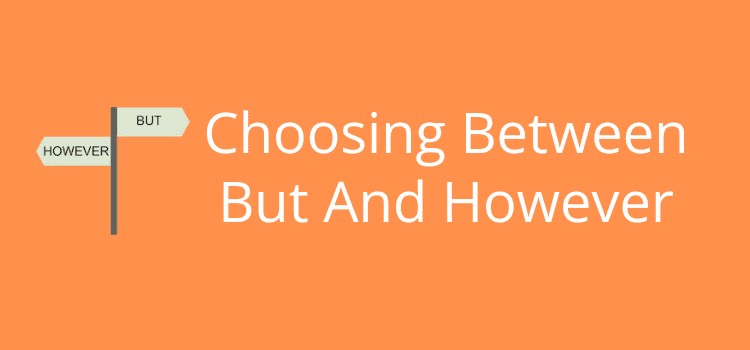
Deciding when to use but and however in your writing might seem like a small detail, but your choice can affect clarity and tone.
The two words serve similar functions. They both introduce a contrast or contradiction but aren’t always interchangeable.
The subtle differences between them can help you write sentences that flow smoothly or create a deliberate pause, depending on what you want.
It’s one little vocabulary detail I constantly correct or change to get it right.
The grammatical difference
The word but is straightforward, direct, and easy to use.
It’s perfect for informal writing or situations where you want to maintain a tight, simple
connection between ideas.
It’s a coordinating conjunction, meaning it joins two independent clauses without requiring any extra punctuation beyond perhaps a comma if the second clause is dependent.
On the other hand, however is a bit more formal and carries a sense of pause.
It’s a conjunctive adverb, so it most often appears at the beginning of a sentence.
If it comes before a clause later in a sentence, it’s usually preceded by a semicolon or, in some cases, by a period (full stop) to begin a new sentence.
While but allows your sentences to flow without interruption, however can give the sense of introducing a slight break, giving the reader a moment to absorb the shift in thought.
The difference is not just in the formality but also in how each word influences the rhythm, tone, and style of your writing.
But is always more conversational and immediate.
For more formal styles however is more reflective. You would use it frequently in technical, business, or academic writing.
Examples of usage
Let’s take a look at some examples to see how the choice between but and however can change the feel, tone, or formality of a sentence.
I wanted to go to the party, but I was too tired.
Here, but links the two ideas closely, making the contrast feel immediate and natural.
I wanted to go to the party. However, I was too tired.
The contrast seems too pronounced, with however creating an unnatural formal pause to over-emphasize the second clause.
The results were promising, but more research is needed.
It suggests a straightforward contrast.
The results were promising. However, more research is needed.
This is more formal and ideally suited to academic writing.
She enjoys cooking but hates cleaning up.
Again, it is a simple, clear, direct sentence.
She enjoys cooking; however, she hates cleaning up.
Considering the topic, it feels unnecessarily formal.
These examples highlight how the choice between but and however can subtly shift the tone and impact of your sentences.
Avoiding repetition
The most common issue with but or however is when they occur consecutively or in sentences close together in a paragraph.
Here’s a typical example.
It’s a free app. But a premium version is also available. But I don’t think the price is attractive.
You can make a variety of changes to avoid repetition.
While it’s a free app, a premium version is also available. However, I don’t think the price is attractive.
It’s a free app with a premium version, but I don’t think the price is attractive.
The app is free. However, a premium version is also available, but I don’t think the price is attractive.
If you need more variety, consider using although or yet to create a similar contrast to avoid repetition.
Differences in meaning
While both words are often interchangeable, there are some subtle variations in meaning.
As a conjunction, but introduces a phrase or clause contrasting with what has already been mentioned.
I didn’t get the job, but I won’t give up.
It can also mean, on the contrary, or with the exception that.
Everyone loved the concert, but me.
When however is used as a conjunctive adverb, it has a very similar meaning. It introduces a statement that contrasts with or seems to contradict something previously said.
She seems shy at first; however, she’s quite outgoing once you get to know her.
It can also be used as a relative adverb, which changes the meaning. It then means in whatever way or regardless of how.
However you decide to approach the problem, make sure you do your research first.
In most sentences, there is little difference, except when using a conjunctive adverb.
Summary
You can’t go wrong if you start a sentence with but or however.
The meanings are almost identical, and the only difference is that you need a comma after however.
When using either in the middle of a sentence to join two clauses, but is the better option as it is much easier to use and doesn’t interrupt the flow of a sentence.
If you want to use however, it’s a bit tricky because you need to use a semicolon or start a new sentence. Both options interrupt the flow or rhythm of a sentence.
In the past, starting a sentence with but was considered poor writing. Now, though, it’s fine to start a sentence with any coordinating conjunction.
The only time you might want to choose is to maintain either a casual, informal, or formal tone. In most cases, however is the better option for formal, business, or academic writing.
It’s always up to you to choose your vocabulary to suit a text. In most cases, it’s usually an easy decision to make.
For simplicity and clarity, you will probably use but most of the time.
The only reasons to use however are to reduce repetition, to add an intentional pause, or to raise the level of formality.
The key factor is to make a deliberate choice, using each word to its best effect to improve the clarity and flow of your writing.
Related Reading: One-Word Sentences In Writing Can Say More With Less
Share This Article


